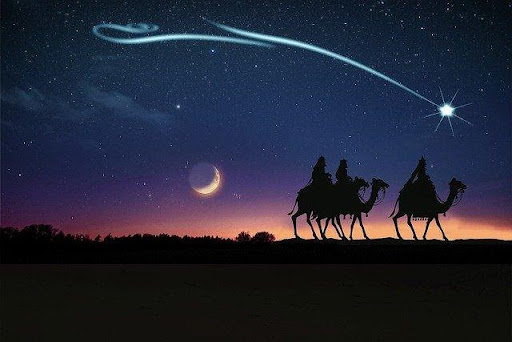What do you think of when you think of “The Three Wise Men”? Are they those guys who get slid into the nativity scene in church just before things get cleared away at the end of the Christmas season? Do you see them as three or more or what? Why did only the gospel of Matthew mention them? Why didn’t Luke, with his boasts that he then makes in The Book of Acts about writing a true historic account in both his gospel and part two?
I seem to be drawn to the Wise men/the three kings as I’ve written other posts about them, even one on this site last year. So I thought I’d check them out a bit more. Now I’d been told at some sermon somewhere that they were possibly Zoroastrians and I found some interesting stuff on this website, which might explain why Matthew, who was allegedly writing to help the Jewish people understand Jesus, includes them:
With the exception of religious conservatives, most religious historians believe the Jewish, Christian and Muslim beliefs concerning God and Satan, the soul, heaven and hell, the virgin birth of the savior, the slaughter of the innocents, resurrection, the final judgment, etc. were all derived from Zoroastrianism.
These men did not just use astrology to show that the birth of the Son of God had been predicted in the heavens, but also were able to connect in the virgin birth and also resurrection, not to mention the way Herod chose to slaughter the innocents.
Matthew’s gospel starts with the genealogy of Jesus, which includes the women in his line, Joseph’s acceptance of who Jesus was, the visit by the Magi, the escape to Egypt, and the slaughter of the innocents. When looked at in the light of the above quote about the Zoroastrians it looks very much as if Matthew is speaking to those who would have known this. I feel that he is saying to show how big this whole birth of Jesus is and how inclusive. It includes women; it includes accepting the miraculous; it includes deep grief too.
How often do we want to include grief in the wonder of Jesus being born? But it is a fact of life. I won’t expand on that because there have been some good posts on Godspace that you can search for. But I think it is one of the amazing things that Matthew makes us aware of, if we look properly, that the miraculous and grief sit hand in hand. This is part of the inclusivity of things. It isn’t just to include men and women, people of various colours, nations, sexualities, and more but it is to include all the range of emotions from joy to grief. If we look properly we can see this as yet another miracle. God doesn’t get rid of certain emotions and life events but knows and understands and walks with us in them.
So as we enter 2022–for many after the last two years with trepidation and uncertainty, with anxiety and fear–let us remember that Jesus was born into this, that God understands this, that we are not walking in alone.
And I’ll end with a prayer one of the characters says towards the end of the Netflix film “Don’t Look Up” which I saw on Jon Kuhrt’s blog the other day, which I think is worth holding on to as we enter this unknown year which will be filled with miracles and grief and all points in between.
Dearest Father and Almighty Creator,
We ask for your grace tonight, despite our pride.
Your forgiveness, despite our doubt.
Most of all Lord, we ask for your love to soothe us through these dark times.
May we face whatever is to come in your divine will,
with courage and open hearts of acceptance.
Amen.
Photo by Pixabay
Breath prayers, scripture readings, walking meditations, creative and contemplative activities, and unstructured time for quiet reflection help us rekindle the wonder of Advent. Enjoy the wonderful opportunity for inner reflection and renewing silence that this free downloadable Advent retreat invites us into as the season of prayerful expectation unfolds.
This retreat is best done with a group—so gather with friends or family, or a church small group.


